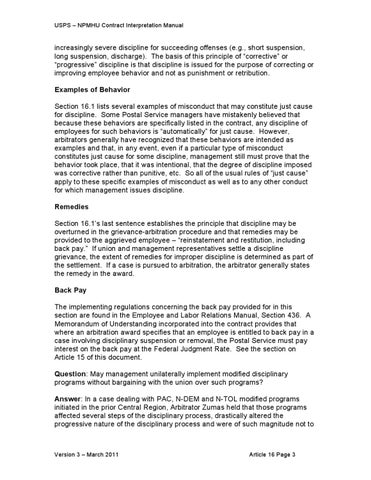USPS – NPMHU Contract Interpretation Manual
increasingly severe discipline for succeeding offenses (e.g., short suspension, long suspension, discharge). The basis of this principle of “corrective” or “progressive” discipline is that discipline is issued for the purpose of correcting or improving employee behavior and not as punishment or retribution. Examples of Behavior Section 16.1 lists several examples of misconduct that may constitute just cause for discipline. Some Postal Service managers have mistakenly believed that because these behaviors are specifically listed in the contract, any discipline of employees for such behaviors is “automatically” for just cause. However, arbitrators generally have recognized that these behaviors are intended as examples and that, in any event, even if a particular type of misconduct constitutes just cause for some discipline, management still must prove that the behavior took place, that it was intentional, that the degree of discipline imposed was corrective rather than punitive, etc. So all of the usual rules of “just cause” apply to these specific examples of misconduct as well as to any other conduct for which management issues discipline. Remedies Section 16.1’s last sentence establishes the principle that discipline may be overturned in the grievance-arbitration procedure and that remedies may be provided to the aggrieved employee – “reinstatement and restitution, including back pay.” If union and management representatives settle a discipline grievance, the extent of remedies for improper discipline is determined as part of the settlement. If a case is pursued to arbitration, the arbitrator generally states the remedy in the award. Back Pay The implementing regulations concerning the back pay provided for in this section are found in the Employee and Labor Relations Manual, Section 436. A Memorandum of Understanding incorporated into the contract provides that where an arbitration award specifies that an employee is entitled to back pay in a case involving disciplinary suspension or removal, the Postal Service must pay interest on the back pay at the Federal Judgment Rate. See the section on Article 15 of this document. Question: May management unilaterally implement modified disciplinary programs without bargaining with the union over such programs? Answer: In a case dealing with PAC, N-DEM and N-TOL modified programs initiated in the prior Central Region, Arbitrator Zumas held that those programs affected several steps of the disciplinary process, drastically altered the progressive nature of the disciplinary process and were of such magnitude not to
Version 3 – March 2011
Article 16 Page 3
